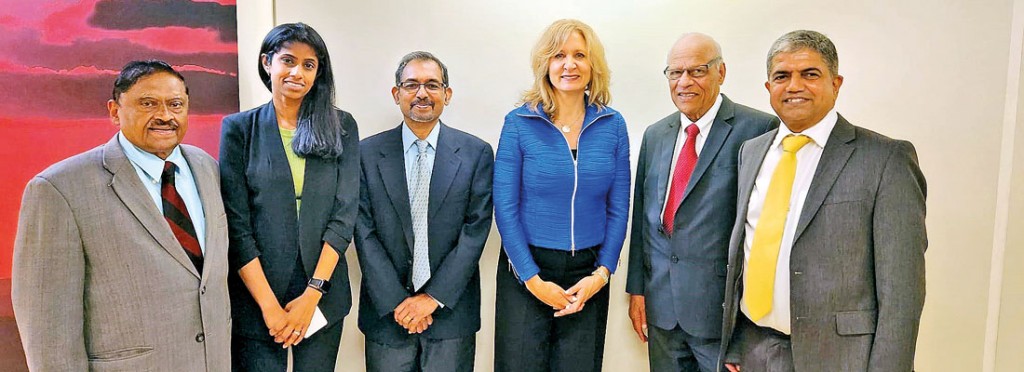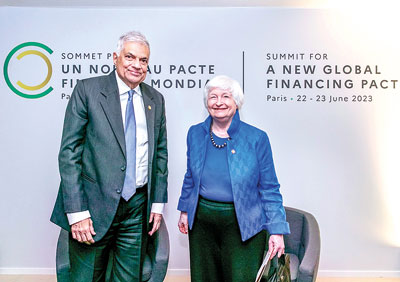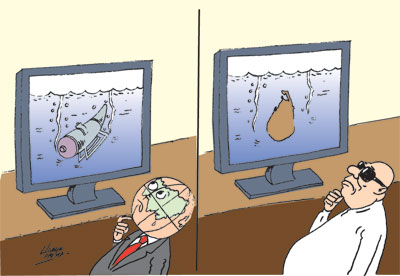- Core group’s statement more passive but persuasive; President apparently given more time to deliver
- Human Rights Chief and core group stress on accountability; Lanka’s envoy rejects any external mechanism
- Tamil Diaspora group in Washington for talks with top US officials who voice support for accountability, human rights issues
By Our Political Editor
UN Human Rights High Commissioner Volker Turk who presented the annual report declared, “In Sri Lanka, although the government has regrettably rejected aspects of the Council’s resolutions related to accountability, it has continued to engage with our presence on the ground. Sri Lanka has received a dozen visits by mandate holders in the past decade and I encourage the authorities to implement their recommendations.”
As the sessions went on in Geneva, a stakeholder group that has been mounting pressure on the international community for stronger UNHRC action, was in Washington D.C. A five-member delegation (from the US, the UK and Canada) of the Global Tamil Forum (GTF) held talks with Donald Lu, Assistant Secretary for South and Central Asia Affairs in the State Department. Lu later tweeted to say, “The US supports accountability and transparency in South Asia.” Assistant Secretary Lu appreciated hearing from the diaspora group GTF on human rights, democracy, and approaches to economic reforms in Sri Lanka. The delegation also met Beth Van Schaack, Ambassador at large for Criminal Justice. She tweeted after the meeting that “effective consultations on justice include diaspora voices. @State GCG appreciated hearing from @GTFonline on ways to promote accountability, human rights, and democracy in Sri Lanka. During talks with both, the delegation had discussed matters now before the UNHRC. The GTF said its also discussed the “long overdue” Provincial Council elections and urged the United States to call for the full implementation of the 13th Amendment.
In contrast, the core group’s approach appeared more passive and persuasive. Diplomatic circles opined that it was to give time and space for President Ranil Wickremesinghe to deliver. The emphasis on accountability was not just from Human Rights High Commissioner Turk but also from the Core Group of countries on Sri Lanka — Canada, Malawi, Montenegro, North Macedonia, the United Kingdom, and the United States. Their statement was delivered by Rita French, the UK Ambassador for Human Rights in Geneva. She noted that “We welcome Sri Lanka’s initial steps towards addressing concerns around land returns, long-term detentions, and corruption. These steps can provide a basis to begin a process to protect the rights of all Sri Lankans, from all ethnic and religious communities.”
The core group noted that “We remain concerned by the continued use of the Prevention of Terrorism Act. We acknowledge an ongoing effort to replace the PTA and urge the Government to ensure that terrorism legislation is consistent with Sri Lanka’s international obligations. We also call on the government to protect freedoms of expression and association.” The group added: “As Sri Lanka takes forward its stated commitment to reconciliation, we stress the importance of transparency, accountability, inclusivity, and of building meaningfully on past work and recommendations that address the root causes of conflicts and impunity.
It is crucial that Sri Lanka safeguards its representative democracy by maintaining voters’ confidence in the country’s electoral systems and ensuring the independence of its institutions and commissions. We call on Sri Lanka to work with the High Commissioner and his office and remain ready to support Sri Lanka in addressing HRC resolution 51/1.”

The five-member Global Tamil Forum team with Ambassador Beth Van Schaak, US Ambassador at large for Criminal Justice
Sri Lanka Accountability Project
By reference to resolution 51/1 the core group insisted that Sri Lanka should implement the resolution which included the Sri Lanka Accountability Project (SLAP). That mandated the Council “to collect, consolidate, analyse and preserve information and evidence and to develop possible strategies for future accountability processes for gross violations of human rights or serious violations of international humanitarian law in Sri Lanka, to advocate for victims and survivors, and to support relevant judicial and other proceedings, including in Member States, with competent jurisdiction.”
The government has categorically rejected this resolution stating that this goes beyond the mandate of the Human Rights Council and threatens the sovereignty of Sri Lanka. Sri Lanka’s Permanent Representative Himalee Arunatilleke, who responded at the opening sessions said that the government was addressing the unprecedented social and economic issues arising from the economic crisis. She said that the government was continuing its focus on the long-term measures towards reconciliation and accountability within the framework of the constitution.” She also emphasised, “Sri Lanka has reiterated its categoric rejection of the external evidence gathering mechanism established following Resolution 46/1, which will have wide-ranging legal and political implications for all countries.
She disclosed that by the beginning of this year, 92% of Northern and Eastern Provinces’ private lands that had been retained by the military had been released to legitimate civilian owners. An additional 100 acres in Palaly in the Northern Province were released on February 3. Action has also been initiated to restore land ownership of people who had been traditionally occupying and cultivating their lands, but which were declared as forest or wildlife reservations after they were abandoned due to the conflict. A roadmap to remap such areas and grant deeds has been approved by the Cabinet of Ministers.
Envoy Karunatilleke pointed out that the Government was engaging in further consultations with all stakeholders on the draft Anti-Terrorism Bill and receiving views to ensure that it was following international standards while catering to domestic needs. The Anti-Corruption Bill which was gazetted in April aims at further strengthening the activities of the Commission to Investigate Allegations of Bribery and Corruption, towards its functional independence and impartiality. This Bill was challenged in the Supreme Court. The Supreme Court has given its determination, she added.
As the 52nd UNHRC session got underway, President Wickremesinghe was taking part in the 40th anniversary of the International Democratic Union in London. Responding to queries from other participants, he said progress was made on initiatives he had taken as the former Premier. He also said: Members of Parliament representing Tamil areas were engaged. Significantly, agreements have been reached on crucial issues, including the establishment of a truth and reconciliation commission, the drafting of legislation, and the presentation of a new anti-terrorism law to Parliament. Resolving the differences between the government and opposition on three major issues, one of them being the definition of terrorism, has been settled by a court ruling. Furthermore, he said that efforts had been made to address land-related concerns in the Northern and Eastern regions, with progress being made on settling these disputes. The Missing Persons Office has taken steps towards addressing issues, and discussions on devolution have yielded potential solutions, which have been shared with Tamil parties. President Wickremesinghe said he hoped to present a comprehensive process by the end of July, acknowledging the time required for the necessary legislative procedures.
Oral update from Deputy UNHRC chief
If one assumed that the core group statement captured what it believed were the ills of Sri Lanka, the United Nations Deputy Human Rights High Commissioner Nada Al-Nashif read out the oral update from the High Commissioner for Human Rights. He was absent for personal reasons. That was a strike on human rights conditions in Sri Lanka. The 51/1 resolution referred to by the core group statement mandated the High Commissioner to give an oral update at the 53rd session and a more detailed written update in September 2023 at the 54th session.
She said the oral update highlights some key developments and trends “from our close monitoring of the situation in Sri Lanka, ahead of the full written update that will be presented to the Council at its 54th session. Sri Lanka has also been reviewed recently through the Universal Periodic Review and by the Human Rights Committee. It added: “The economic crisis continues to have a severe impact on the rights and well-being of many Sri Lankans. Discussions with creditors are underway, and although this year the International Monetary Fund (IMF) approved a financial support package, which is an important first step, it is crucial to ensure that the burden of reforms does not further compound inequalities. The update said:

President Ranil Wickremesinghe meeting US Treasury Secretary Janet Yellen in Paris this week on the sidelines of a summit French President Emmanuel Macron convened to work out a New Global Financial Pact
“Robust safety nets and social protection measures are needed to shelter the most vulnerable from the negative spillovers of economic restructuring. It is also vital to address the underlying factors of the crisis, including corruption, which was a loud and essential demand of the protests in 2022. The protest movement loudly expressed society’s aspirations for better governance and an inclusive vision of Sri Lanka. Twelve months on, the full potential for the historic transformation that would address long-standing challenges has yet to be realised. Our Office urges the Government and political parties in Sri Lanka to use this opportunity for democratic renewal, deeper institutional reforms and to advance accountability and reconciliation as well as the promotion and the protection of human rights. This would be particularly appropriate in a year that marks the 75th anniversary of both Sri Lanka’s independence and the Universal Declaration of Human Rights.
There was praise for President Ranil Wickremesinghe for having initiated a dialogue with Tamil political parties and …. welcomed his promise to stop land acquisition for archaeological, forestry or security purposes – an increasing source of local conflict and tension. Plans for more inclusive memorialisation and other forms of dealing with the past have been announced. The Supreme Court has issued an important order for compensation to be paid to the victims of the 2019 Easter Sunday attacks. However, these intentions need to materialise into new laws, policies and practices that will make good on these promises and bring about tangible changes.
The European Union on the other hand picked solely on the Prevention of Terrorism Act (PTA). This is also because of the General Scheme of Preference Plus (GSP+) for which Sri Lanka has reapplied. It depends on the way Sri Lanka progresses with the PTA. To grant full GSP+, the EU has insisted that Sri Lanka must replace the PTA with laws that are in accordance with international standards. The decision on GSP+ is due later this year.
The EU said, “It takes note of the Sri Lankan Government’s commitment to replace the Prevention of Terrorism Act (PTA) with its broad powers, with a new law in line with international standards.” The EU added: “The importance of bringing counter-terrorism legislation fully in line with international norms and standards cannot be over-stated. The EU strongly encourages a genuine consultation process considering concerns and recommendations provided by legal experts and civil society so that the PTA is finally replaced by a legislation ensuring that the rights of citizens are protected and respected, and calls on the authorities to refrain from using the PTA.“
The oral update said: “The Government has committed to replacing the Prevention of Terrorism Act with legislation that adheres to international standards, but the new “Anti-terrorism” Bill gazetted in March contained sweeping provisions that would limit freedom of expression, peaceful assembly and even labour rights. Following strong pushback from civil society, the draft bill has been recalled for additional consultations. I encourage the Government to repeal the Prevention of Terrorism Act, and in the meantime to implement fully a strict moratorium on its use, considering that the ordinary criminal code and other ancillary laws already provide adequate tools for law enforcement.”
The oral update went on to add: “Similarly anticipated is the Constitutional Council’s new appointments to the Human Rights Commission of Sri Lanka — an important test of the independence and effectiveness of this critical national institution.
“The announcement of plans for a Truth Commission or similar reconciliation mechanisms requires attention.” It became clear that the UNHRC response to the proposed Truth and Reconciliation Commission is lukewarm. It has also cast doubts on the Office of the Missing Persons. The update said, “Sri Lanka has witnessed too many ad hoc commissions in the past that failed to ensure accountability. The Office of Missing Persons has not achieved the results that provide satisfaction to victims. What is needed is a coherent plan that connects the different elements of truth, redress, memorialisation, accountability and creates the right enabling environment for a successful and sustainable transitional justice process. Accountability remains the fundamental gap in attempts to deal with the past. As long as impunity prevails, Sri Lanka will achieve neither genuine reconciliation nor sustainable peace.”
The update also delved into the Sri Lanka Accountability Project (SLAP) despite the government’s repeated rejection of the move. The oral update said: “I am pleased to report that the project team established in our Office to advance accountability has continued to make progress pursuant to resolution 51/1. It is in the process of providing concrete support to several jurisdictions who have ongoing criminal justice investigations. It is conducting proactive investigation work on key cases and collecting, consolidating, and analysing information and evidence from a variety of UN and other sources, which is preserved in a repository so as to be used for future accountability initiatives. Victims remain at the heart of this work, including through our active engagement with victim organisations and civil society more broadly.
“Fundamentally, it is and remains the responsibility of the Sri Lankan authorities to directly acknowledge past violations and undertake credible investigations and prosecutions, alongside other accountability measures. However, as long as this “accountability deficit” remains, the international community can – and should – play complementary roles. Means to do so include use of accepted principles of universal and extraterritorial jurisdiction to investigate and prosecute alleged perpetrators, and support to the relevant accountability processes in third States, as well as fair application of targeted sanctions against credibly alleged perpetrators.”
An area that should cause serious concern for the government is the Sri Lanka Accountability Project (SLAP). Other than rejecting altogether the move by the Human Rights Council, the government has no other leverage to either stall or altogether stop the exercise that is underway. It has come to light that some countries have sought information about leading Sri Lankan personalities and their links to the military campaign against Tiger guerrillas.
The past months have unfortunately witnessed the old reflex of using draconian laws to curtail opposition and control civic space, with a heavy-handed approach to protests far too often, including the arrest of protest leaders and forceful crowd control measures, as well as the persistent use of the military in police functions. Recent arrests over statements made during comedy performances and of a member of parliament engaged in protests exemplified this concern. In March 2023, the Human Rights Council expressed deep concern about the misuse of the ICCPR Act against journalists, human rights defenders, and other civil society actors.
As revealed in these columns, the Human Rights High Commissioner’s oral update confirmed that the SLAP team is working on gathering evidence on specific cases of alleged international law violations for specific countries’ jurisdictions. In his explicit update on progress by the SLAP team, his oral update refers specifically to, “It is in the process of providing concrete support to several jurisdictions which have ongoing criminal justice investigations. It is conducting proactive investigation work on key cases and collecting, consolidating and analysing information and evidence from a variety of UN and other sources, which is preserved in a repository so as to be used for future accountability initiatives.”
In direct reference to what the then High Commissioner referred to as ‘Economic Crimes’, in his oral update this new High Commissioner says, “The economic crisis continues to have a severe impact on the rights and well-being of many Sri Lankans….. It is also vital to address the underlying factors of the crisis, including corruption, which was a loud and essential demand of the protests in 2022.”
A Geneva-based diplomat noted that none of the formal statements contained any calls for elections in Sri Lanka. For example, the Provincial Council elections are due for the past five years. However, just last week, US Secretary of State Anthony Blinken announced a new visa policy under the Immigration and Nationality Act to support Bangladesh’s goal of holding free, fair, and peaceful national elections. The move helps the US government to restrict the issuance of visas for Bangladeshi nationals, believed to be responsible for, or complicit in, undermining the democratic election process in Bangladesh. In the case of Sri Lanka, is it giving President Ranil Wickremesinghe more time and space to deliver?

View(s): 130